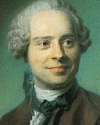 (source)
(source)
|
Jean le Rond D’Alembert
(16 Nov 1717 - 29 Oct 1783)
French mathematician known for his work in various fields of applied mathematics, in particular dynamics. He invented and developed of the theory of partial differential equations.
|
Science Quotes by Jean le Rond D’Alembert (9 quotes)
A philosopher is a fool who torments himself while he is alive, to be talked of after he is dead.
— Jean le Rond D’Alembert
As translated, without citation, in Familiar Short Sayings of Great Men: With Historical and Explanatory Notes (1887), 6.
Algebra is generous; she often gives more than is asked of her.
L’algèbre est généreuse, elle donne souvent plus qu’on lui demande.
L’algèbre est généreuse, elle donne souvent plus qu’on lui demande.
— Jean le Rond D’Alembert
As translated in Robert Edouard Moritz, Memorabilia Mathematica; Or, The Philomath’s Quotation-Book (1914), 275. The original French, without citation for “the oft-quoted words”, is given in Edward Kasner, 'The Present Problems of Geometry', Bulletin of the American Mathematical Society (1905), 11, No. 6, 285, from an address to the Section of Geometry, International Congress of Arts, St. Louis (24 Sep 1904). Also appears in French, in a quote by Hankel (without citation), as: “« L’Algèbre est généreuse, a dit D’Alembert, elle donne souvent plus qu’on ne lui demande.» On interprète alors les solutions dites étrangères et qui sont celles du problème élargi, généralisé. Le calcul ne tient nul compte de nos restrictions.” From Alphonse Rebière, Mathématiques et mathématiciens: pensées et curiosités (1889), 29-30, given by Google Translate as: “‘Algebra is generous,’ said D’Alembert, ‘it often gives more than is asked of it.’ We then interpret the so-called foreign solutions and which are those of the broader, generalized problem. The calculation does not take into account our restrictions.” [Note, compared to the former, the latter French quote is printed with an additional word, “ne”, in “qu’on ne lui demande.” —Webmaster]
Geometry, which should only obey Physics, when united with it sometimes commands it. If it happens that the question which we wish to examine is too complicated for all the elements to be able to enter into the analytical comparison which we wish to make, we separate the more inconvenient [elements], we substitute others for them, less troublesome, but also less real, and we are surprised to arrive, notwithstanding a painful labour, only at a result contradicted by nature; as if after having disguised it, cut it short or altered it, a purely mechanical combination could give it back to us.
— Jean le Rond D’Alembert
From Essai d’une nouvelle théorie de la résistance des fluides (1752), translated as an epigram in Ivor Grattan-Guinness, Convolutions in French Mathematics, 1800-1840: From the Calculus and Mechanics to Mathematical Analysis and Mathematical Physics (1990), Vol. 1, 33.
High office is like a steep crag that is reached only by eagles and reptiles.
— Jean le Rond D’Alembert
In 'Éloge de l’Abbé de Choisy', collected in Éloges Lus Dans Les Séances Publiques de l'Académie Françoise (1779), 309-310. From the original French, “les grandes places sont comme les rochers escarpés, qu'il n'y a que les aigles & les reptiles qui y parviennent.” As translated above by Webmaster. Using “high office” for “les grandes places” (more literally, “great places” or “grand seats”) is based on the context of the whole paragraph containing the quote. Elsewhere on the web, the quote is found more freely translated as “High office, is like a pyramid; only two kinds of animals reach the summit—reptiles and eagles.” Webmaster thinks that eagles and reptiles scaling a “steep crag” makes a better mental picture than a “pyramid.”
Just go on ... and faith will soon return.
[To a friend hesitant with respect to infinitestimals].
[To a friend hesitant with respect to infinitestimals].
— Jean le Rond D’Alembert
As expressed in P. J. Davis and R. Hersh, The Mathematical Experience (1981, 1995), 277.
Nothing is more incontestable than the existence of our sensations; … they are the principle of all our knowledge.
— Jean le Rond D’Alembert
From Discours préliminaire de l’Encyclopédie, collect in Œvres d’Alembert: Tome Premier (1821), 19. Translated from the original French, “Rien n'est plus incontestable que l’existence de nos sensations; … elles sont le principe de toutes nos connaissances.”
Of all the sciences that pertain to reason, Metaphysics and Geometry are those in which imagination plays the greatest part. … Imagination acts no less in a geometer who creates than in a poet who invents. It is true that they operate differently on their object. The first shears it down and analyzes it, the second puts it together and embellishes it. … Of all the great men of antiquity, Archimedes is perhaps the one who most deserves to be placed beside Homer.
— Jean le Rond D’Alembert
From the original French: “La Métaphysique & la Géométrie sont de toutes les Sciences qui appartiennent à la raison, celles où l’imagination à le plus de part. … L’imagination dans un Géometre qui crée, n’agit pas moins que dans un Poëte qui invente. Il est vrai qu’ils operent différemment sur leur objet; le premier le dépouille & l’analyse, le second le compose & l’embellit. … De tous les grands hommes de l’antiquité, Archimede est peut-être celui qui mérite le plus d’être placé à côté d’Homere.” In Discours Preliminaire de L'Encyclopedie (1751), xvi. As translated by Richard N. Schwab and Walter E. Rex, Preliminary Discourse to the Encyclopedia of Diderot (1963, 1995), xxxvi. A footnote states “Note that ‘geometer’ in d’Alembert’s definition is a term that includes all mathematicians and is not strictly limited to practitioners of geometry alone.” Also seen in a variant extract and translation: “Thus metaphysics and mathematics are, among all the sciences that belong to reason, those in which imagination has the greatest role. I beg pardon of those delicate spirits who are detractors of mathematics for saying this …. The imagination in a mathematician who creates makes no less difference than in a poet who invents…. Of all the great men of antiquity, Archimedes may be the one who most deserves to be placed beside Homer.” This latter translation may be from The Plan of the French Encyclopædia: Or Universal Dictionary of Arts, Sciences, Trades and Manufactures (1751). Webmaster has not yet been able to check for a verified citation for this translation. Can you help?
The only way in which to treat the elements of an exact and rigorous science is to apply to them all the rigor and exactness possible.
— Jean le Rond D’Alembert
Quoted in De Morgan, Trigonometry and Double Algebra (1849), Title page.
We may regard geometry as a practical logic, for the truths which it considers, being the most simple and most sensible of all, are, for this reason, the most susceptible to easy and ready application of the rules of reasoning.
— Jean le Rond D’Alembert
From 'De la Géométrie', Pensées de Monsieur d’Alembert (1774), 137. As translated in Robert Édouard Moritz, Memorabilia Mathematica; Or, The Philomath’s Quotation-Book (1914), 203. From the original French, “On peut regarder la géométrie comme une logique pratique, parce que les vérités dont elle s'occupe, étant les plus simples et les plus sensibles de toutes, sont par cette raison, les plus susceptibles d'une application facile et palpable des règles du raisonnement.”
Quotes by others about Jean le Rond D’Alembert (4)
As is well known the principle of virtual velocities transforms all statics into a mathematical assignment, and by D'Alembert's principle for dynamics, the latter is again reduced to statics. Although it is is very much in order that in gradual training of science and in the instruction of the individual the easier precedes the more difficult, the simple precedes the more complicated, the special precedes the general, yet the min, once it has arrived at the higher standpoint, demands the reverse process whereby all statics appears only as a very special case of mechanics.
Collected Works (1877), Vol. 5, 25-26. Quoted in G. Waldo Dunnington, Carl Friedrich Gauss: Titan of Science (2004), 412.
Accordingly, we find Euler and D'Alembert devoting their talent and their patience to the establishment of the laws of rotation of the solid bodies. Lagrange has incorporated his own analysis of the problem with his general treatment of mechanics, and since his time M. Poinsôt has brought the subject under the power of a more searching analysis than that of the calculus, in which ideas take the place of symbols, and intelligent propositions supersede equations.
J. C. Maxwell on Louis Poinsôt (1777-1859) in 'On a Dynamical Top' (1857). In W. D. Niven (ed.), The Scientific Papers of James Clerk Maxwell (1890), Vol. 1, 248.
The persons who have been employed on these problems of applying the properties of matter and the laws of motion to the explanation of the phenomena of the world, and who have brought to them the high and admirable qualities which such an office requires, have justly excited in a very eminent degree the admiration which mankind feels for great intellectual powers. Their names occupy a distinguished place in literary history; and probably there are no scientific reputations of the last century higher, and none more merited, than those earned by great mathematicians who have laboured with such wonderful success in unfolding the mechanism of the heavens; such for instance as D ’Alembert, Clairaut, Euler, Lagrange, Laplace.
In Astronomy and General Physics (1833), Bk. 3, chap. 4, 327.
We pass with admiration along the great series of mathematicians, by whom the science of theoretical mechanics has been cultivated, from the time of Newton to our own. There is no group of men of science whose fame is higher or brighter. The great discoveries of Copernicus, Galileo, Newton, had fixed all eyes on those portions of human knowledge on which their successors employed their labors. The certainty belonging to this line of speculation seemed to elevate mathematicians above the students of other subjects; and the beauty of mathematical relations and the subtlety of intellect which may be shown in dealing with them, were fitted to win unbounded applause. The successors of Newton and the Bernoullis, as Euler, Clairaut, D’Alembert, Lagrange, Laplace, not to introduce living names, have been some of the most remarkable men of talent which the world has seen.
In History of the Inductive Sciences, Vol. 1, Bk. 4, chap. 6, sect. 6.
See also:






 In science it often happens that scientists say, 'You know that's a really good argument; my position is mistaken,' and then they would actually change their minds and you never hear that old view from them again. They really do it. It doesn't happen as often as it should, because scientists are human and change is sometimes painful. But it happens every day. I cannot recall the last time something like that happened in politics or religion.
(1987) --
In science it often happens that scientists say, 'You know that's a really good argument; my position is mistaken,' and then they would actually change their minds and you never hear that old view from them again. They really do it. It doesn't happen as often as it should, because scientists are human and change is sometimes painful. But it happens every day. I cannot recall the last time something like that happened in politics or religion.
(1987) -- 


